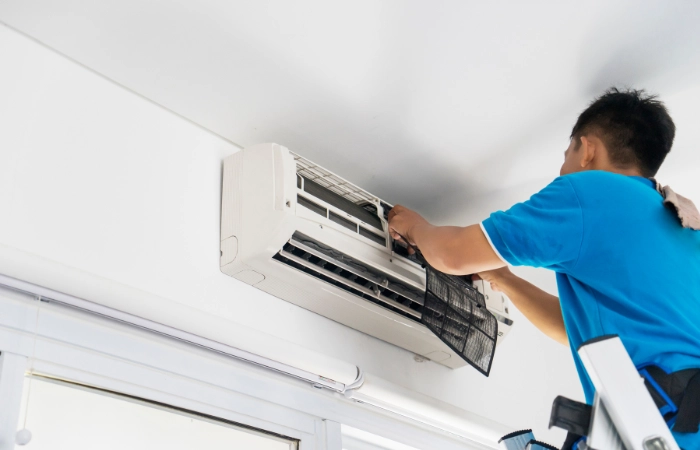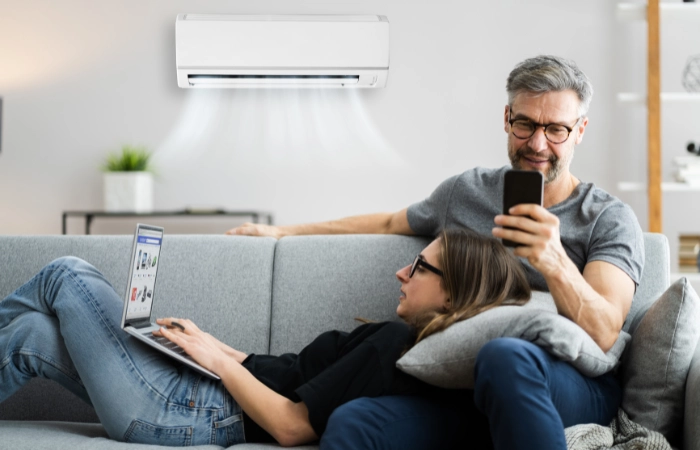Have you ever walked into your home on a scorching summer day, only to be greeted by a blast of cool air that somehow still feels muggy? If so, you’re likely experiencing the effects of air conditioner humidity. While air conditioners are designed to not only cool but also dehumidify the air, sometimes they don’t quite get the job done. In this blog, we’ll explore why your home might feel humid despite your AC running and explore solutions to fix it.
Ideal Air Conditioning Humidity
Although air conditioners are designed to cool your home, they also play a significant role in managing air conditioner humidity. Ideally, indoor relative humidity should range between 30% and 50%. If humidity drops below 30%, the air can feel dry and itchy, potentially causing respiratory irritation. Conversely, humidity levels exceeding 50% can make your home feel muggy and uncomfortable, encouraging mold growth and dust mite proliferation.
Signs Your Air Conditioning Is Not Dehumidifying Your Home
Even though air conditioners are designed to both cool and dehumidify the air, they can sometimes fall short in effectively managing air conditioner humidity. Here are some signs that your air conditioning system may not be adequately dehumidifying your home:
• Condensation
Excessive condensation occurs when warm, moist air meets cooler surfaces, resulting in water vapor turning into liquid water. This phenomenon is particularly common on windows during hot, humid weather. Not only can condensation obscure your view, but it can also lead to water damage and mold growth if not addressed promptly. To reduce condensation, ensure good ventilation in your home, and consider using dehumidifiers in areas prone to moisture buildup.
• Sticky or Clammy Feeling
Elevated levels of air conditioner humidity can create a heavy and uncomfortable atmosphere, even with your air conditioner operating. This sensation occurs because perspiration does not evaporate as efficiently in humid environments, leaving you feeling sticky and clammy.
Additionally, high humidity can hinder the body’s natural cooling mechanism, making it harder to regulate body temperature. To combat this discomfort, try lowering indoor humidity levels through proper ventilation and dehumidification.
• Musty Odors
Mold and mildew thrive in moist environments, releasing musty odors that can spread throughout your home. These odors are not only unpleasant but also indicate potential mold growth, which can pose health risks, especially for individuals with respiratory conditions.
To eliminate musty odors, address the source of excess moisture by repairing leaks, improving ventilation, and using dehumidifiers as needed. Moreover, consider incorporating air purifiers with HEPA filters to remove airborne mold spores and enhance indoor air quality.
• Allergy Symptoms
Increased humidity levels create an ideal breeding ground for dust mites and mold, common allergens that can exacerbate allergy symptoms like sneezing, coughing, and itchy eyes. Dust mites thrive in humid environments by feeding on dead skin cells and reproducing rapidly.
Mold spores, which are released into the air when mold grows, can trigger allergic reactions and respiratory problems in sensitive individuals. To reduce allergy symptoms, maintain indoor humidity levels between 30% and 50% and implement measures to control dust mites and mold, such as regular cleaning, using allergen-proof bedding, and utilizing air purifiers with HEPA filters.
Possible Causes of AC Humidity

Now that we’ve identified the signs of inadequate dehumidification by your air conditioning system, let’s explore the possible causes of these issues. Understanding the root cause of air conditioner humidity problems is crucial for implementing effective solutions. Here are some common culprits:
1. Oversized AC Unit
An air conditioner that is too large for your home’s cooling needs may cool the air quickly but fail to adequately address air conditioner humidity. This is because oversized units cycle on and off frequently, leading to short run times that do not allow enough time for moisture removal. As a result, humidity levels remain high despite the air feeling cool.
2. Clogged Air Filters
Dirty or blocked air filters limit airflow, which reduces the efficiency of your air conditioning system. This reduced airflow can hinder the removal of moisture from the air, causing increased indoor humidity levels. To maintain optimal performance and airflow, be sure to check and replace air filters regularly.
3. Leaky Ductwork
Leaks in your ductwork allow warm, humid air from attics, crawl spaces, or outdoors to enter your home, working against your air conditioner’s efforts. This flow of humid air counteracts the cooling and dehumidification process, resulting in increased indoor humidity levels. Have your ductwork inspected regularly and seal any leaks to prevent unwanted air infiltration.
4. Low Refrigerant Levels
Refrigerant plays a crucial role in both cooling and managing air conditioner humidity within your AC unit. If your air conditioner lacks sufficient refrigerant, it can malfunction, resulting in diminished cooling capabilities and ineffective moisture removal. If you suspect that your air conditioner is low on refrigerant, contact a qualified HVAC technician to inspect and recharge the system as needed.
FAQs on Air Conditioner Humidity
Can air conditioners cause low humidity in the home?
Yes, air conditioners can lower indoor humidity levels, especially in dry climates or when set to a low temperature. While air conditioners primarily remove moisture from the air to cool it, excessive dehumidification can sometimes lead to dry indoor air, which may cause discomfort or respiratory issues for some individuals.
Does cool mode remove humidity?
Yes, when your air conditioner is set to cool mode, it helps remove humidity from the air by cooling it down. As warm air passes over the cold coils inside the AC, moisture in the air condenses, turning into water droplets. These droplets are then drained away, effectively reducing humidity levels indoors.
Will upgrading my air conditioner solve humidity issues?
In certain situations, it might be necessary to switch to a newer, more energy-efficient air conditioner that offers improved capabilities in managing air conditioner humidity levels effectively. Seek advice from a certified HVAC technician to find the most suitable air conditioning system for your specific needs and requirements. For enhanced energy efficiency, choosing the right system is crucial.
Conclusion
Air conditioner humidity issues can make your home feel uncomfortable and lead to various problems, such as mold growth and health issues. By recognizing the signs of high indoor humidity and addressing potential causes, you can ensure that your air conditioner effectively dehumidifies your home, keeping you comfortable and healthy all year round.
For professional assistance with your air conditioning needs, Tropic Air-Conditioning Inc. offers a range of services to guarantee your home’s performance and comfort are optimal. Don’t let air conditioner humidity affect your comfort – contact us today for trustworthy HVAC services you can rely on.




